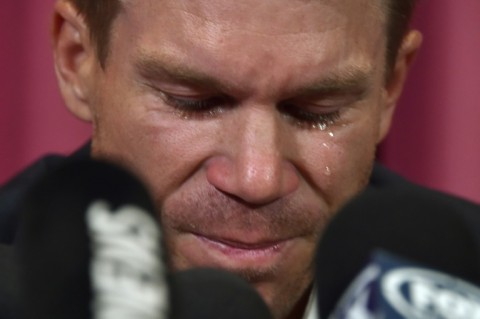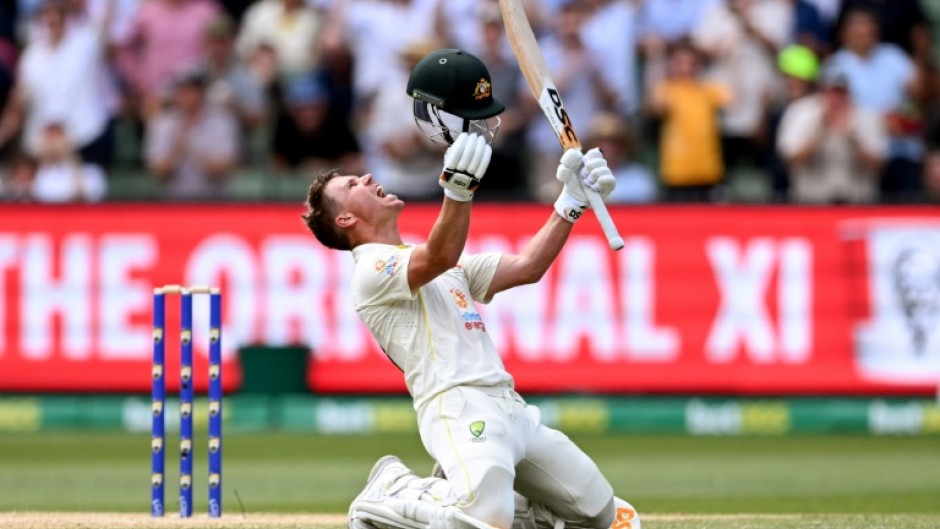SYDNEY - David Warner exits Test cricket this week as one of the best openers the world has known, but his exploits will forever be overshadowed by the role he played in the notorious ball-tampering scandal of 2018.
The polarising 37-year-old Australian will pad up for an emotional farewell at the Sydney Cricket Ground in the third Test against Pakistan after a career that began when he faced New Zealand at Brisbane in 2011.
In his 111 Tests, the left-hander has plundered 8,695 runs at an average of 44.58, with 26 centuries and 36 half-centuries.
A larger-than-life character, Warner also collected 89 catches as one of the most consistent slip fielders in the game.
"He is probably our greatest ever three-format player. He'll be a loss," Australian coach Andrew McDonald said on Saturday.
"Other people have been gunning for him for a period of time but for us, internally, we've seen the great value and what he brings to the table, hence why we've kept picking him.
"It can be hard to replace someone who is striking at 70, averaging 45, most ever runs as an Australian opener."
But Warner, who plans to continue in white-ball cricket, has made enemies along the way, with former Australian quick bowler Mitchell Johnson letting rip ahead of the Pakistan series.
"Yes, he has a decent overall record and some say is one of our greatest opening bats," he said.
"But his past three years in Test cricket have been ordinary, with a batting average closer to what a tail-ender would be happy with.
"It's the ball tampering disgrace in South Africa that many will never forget."
- Remorseful -
Warner's dark side came into play as the chief plotter in the 'sandpaper-gate' scandal in South Africa, which shattered a reputation already bruised by numerous run-ins.

Along with skipper Steve Smith, he was banned for a year by Cricket Australia for his part in the third Test debacle in Cape Town that saw Cameron Bancroft use sandpaper to scuff the ball before a crude attempt to conceal the evidence down his trousers.
Part of the punishment saw Warner stripped of the vice-captaincy and banned from ever leading the team, crushing his dream of captaining Australia's one-day side.
For many in the game, the assertive Warner's involvement was hardly a surprise.
In June 2013, he was suspended and fined for punching England's Joe Root in a Birmingham bar on the eve of the Ashes.
"I'm extremely remorseful. I have let my teammates, Cricket Australia, the fans, myself and my family down," said Warner at the time.
Two months earlier, he was similarly contrite after an ugly Twitter spat with two Australian journalists.
But his trademark combative nature never dimmed.
In the opening Test in Durban ahead of the ball-tampering fiasco, he and Quinton de Kock squared up to each other, with Warner claiming the home wicket-keeper had made "vile and disgusting" remarks about his wife Candice.
Warner was fined 75 percent of his match fee and De Kock 25 percent.

Despite the controversies, he was welcomed back into the Australia fold when his ban ended, and made his Test comeback during the Ashes series against England in 2019.
It was a miserable return, scoring just 95 runs in 10 innings at a paltry average of 9.5 while being repeatedly booed by English fans.
But selectors again kept faith and he bounced back later that year with an unbeaten 335 against Pakistan in Adelaide and has been ever present since.
Former Australia captain Greg Chappell said Warner would "never live down the sandpaper-gate incident", but he urged people to look past it to his overall contribution to the team spanning more than a decade.
"Whatever one thinks of him, David Warner has been fantastic for Australian cricket," he wrote in the Sydney Morning Herald this weekend.
"I know how hard it is to do what he has done through 111 Tests, so I hope that David's harshest critics acknowledge his talent and contribution and forgive his human frailties."
mp/dh
By Martin Parry

